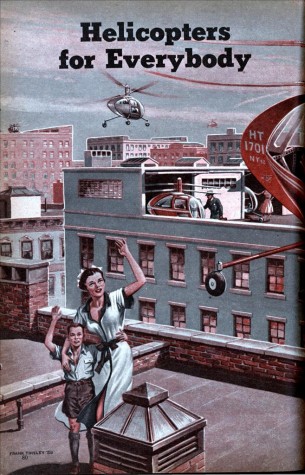Flying into the future
Innovation requires acceptance of change
Less than ten hands go up in a sea of listeners. Dr. Snyder, Professor and Chair of Genetics at Stanford University, asked the audience to raise their hands if they wanted a free genetic diagnosis that would enlighten patients on their risks for numerous chronic diseases. “I wouldn’t like to be cast in Gattaca: The Sequel,” replied an audience member only half-jokingly.
Advancements like personalized genetic profiling, 3D printing, self-driving cars and the Internet of Things have the potential to revolutionize healthcare, manufacturing, transportation and data management. The general public often fails to recognize the potential of new inventions and dismisses them as unreasonable, trivial or immoral. This is far from an unprecedented problem.
In the early 20th century, aviation took off in popularity following the success of the Wright Brothers but was only available to rich hobbyists and the military. Entrepreneurs looked at what happened to the car and believed the same trend would appear in the aviation industry: smaller, mass-produced, cheap vehicles made for widespread individual use.

The idea of commuting to work everyday in one-man mini-helicopters sounded even more ridiculous in a time when horse-drawn carriages were a common sight, so the idea was quickly scrapped. Any hope for a plane for civilians was dead. By 2012, however, over 800 million civilians traveled on a transcontinental or international airplane.
Human nature resists change, especially when the status quo is comfortable. By telling ourselves that “car travel is safe enough” or “chronic diseases are a rare, unfortunate aspect of life”, we lose the desire to further enhance fields that have room for improvement.
Innovation is not something a legendary entrepreneur of the past achieved; it is an ongoing process that requires effort from all members of society to support. Apple, a tech-titan that revolutionized the personal computer and smartphone industries under the leadership of Steve Jobs, is slowing down in its innovation. While still releasing successful new products, most releases only improve on previously established models, nothing truly revolutionary. Companies, formerly at the spearhead of innovation, are losing their pioneer status and becoming mature, stable organizations.
In order to continue growth, we must allow new ideas to incubate and display their potential become the next revolutionary idea. Constructive criticism rarely inhibits innovation; it can assist in the positive development of new ideas derived from old, flawed ideas. But rejecting an innovative approach or idea based off problems we have with a novel, unrefined proposal is as ludicrous as airplane commutes.
This piece was originally published in the pages of The Winged Post on May 13, 2015.
Adrian Chu (12) is a columnist for the Winged Post and Aquila. He has served as an Opinion Editor for The Winged Post. This is his fourth year in journalism,...


















![“[Building nerf blasters] became this outlet of creativity for me that hasn't been matched by anything else. The process [of] making a build complete to your desire is such a painstakingly difficult process, but I've had to learn from [the skills needed from] soldering to proper painting. There's so many different options for everything, if you think about it, it exists. The best part is [that] if it doesn't exist, you can build it yourself," Ishaan Parate said.](https://harkeraquila.com/wp-content/uploads/2022/08/DSC_8149-900x604.jpg)




![“When I came into high school, I was ready to be a follower. But DECA was a game changer for me. It helped me overcome my fear of public speaking, and it's played such a major role in who I've become today. To be able to successfully lead a chapter of 150 students, an officer team and be one of the upperclassmen I once really admired is something I'm [really] proud of,” Anvitha Tummala ('21) said.](https://harkeraquila.com/wp-content/uploads/2021/07/Screen-Shot-2021-07-25-at-9.50.05-AM-900x594.png)







![“I think getting up in the morning and having a sense of purpose [is exciting]. I think without a certain amount of drive, life is kind of obsolete and mundane, and I think having that every single day is what makes each day unique and kind of makes life exciting,” Neymika Jain (12) said.](https://harkeraquila.com/wp-content/uploads/2017/06/Screen-Shot-2017-06-03-at-4.54.16-PM.png)








![“My slogan is ‘slow feet, don’t eat, and I’m hungry.’ You need to run fast to get where you are–you aren't going to get those championships if you aren't fast,” Angel Cervantes (12) said. “I want to do well in school on my tests and in track and win championships for my team. I live by that, [and] I can do that anywhere: in the classroom or on the field.”](https://harkeraquila.com/wp-content/uploads/2018/06/DSC5146-900x601.jpg)
![“[Volleyball has] taught me how to fall correctly, and another thing it taught is that you don’t have to be the best at something to be good at it. If you just hit the ball in a smart way, then it still scores points and you’re good at it. You could be a background player and still make a much bigger impact on the team than you would think,” Anya Gert (’20) said.](https://harkeraquila.com/wp-content/uploads/2020/06/AnnaGert_JinTuan_HoHPhotoEdited-600x900.jpeg)

![“I'm not nearly there yet, but [my confidence has] definitely been getting better since I was pretty shy and timid coming into Harker my freshman year. I know that there's a lot of people that are really confident in what they do, and I really admire them. Everyone's so driven and that has really pushed me to kind of try to find my own place in high school and be more confident,” Alyssa Huang (’20) said.](https://harkeraquila.com/wp-content/uploads/2020/06/AlyssaHuang_EmilyChen_HoHPhoto-900x749.jpeg)



